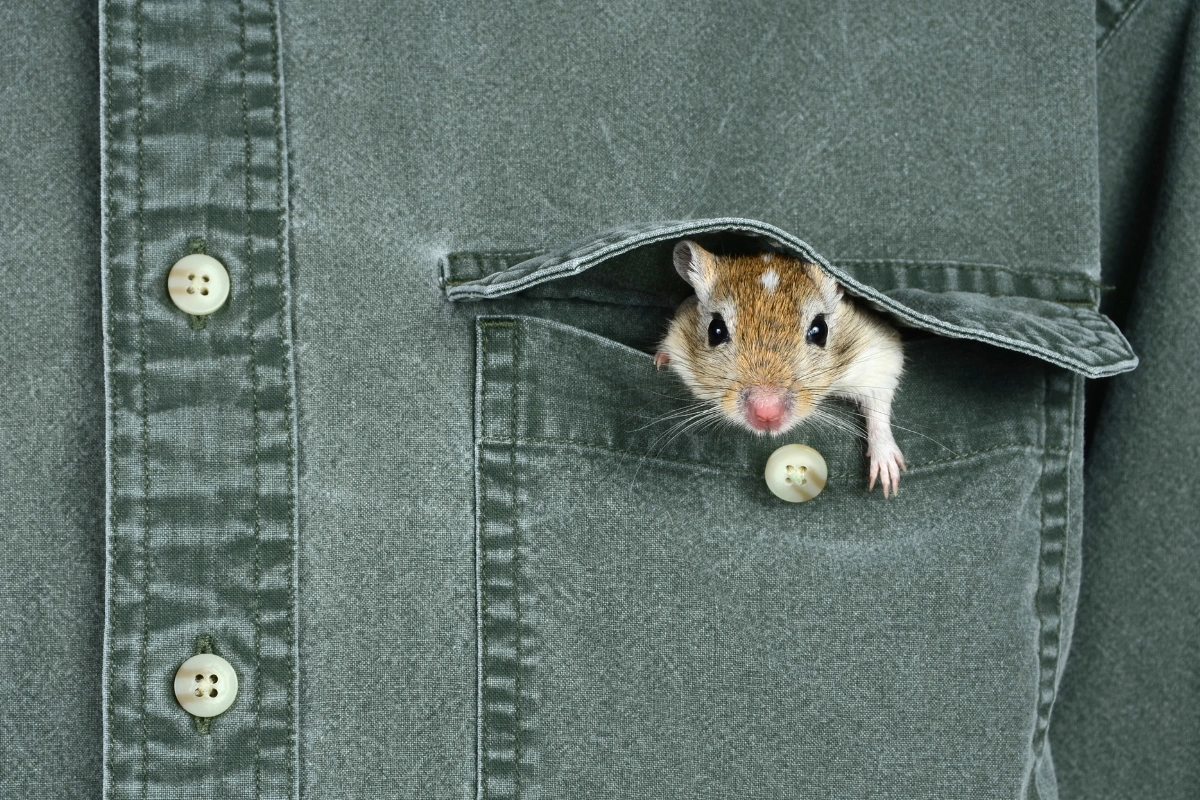If you’re considering a pet but don’t have the space or time for a large animal like a dog or a cat, pocket pets could be the perfect solution. These small-sized mammals are not only cute and easy to handle but also offer a wonderful alternative to more conventional pets.
What is a Pocket Pet?
A “pocket pet” refers to any small animal that’s easy to care for, affordable, and can fit in your hand or lap—hence the name “pocket.” These pets are typically smaller mammals that don’t require much space or time, making them an attractive alternative to larger pets like dogs or cats.
Here are the top 10 small furry pets that make great companions, each with their unique traits and personalities.
1. Hedgehog: The Nocturnal Rebel
Hedgehogs, with their spiky hair and independent nature, are ideal for people who are night owls. These nocturnal creatures are most active at night, so if you’re a late-night person, a hedgehog might be the perfect fit. They need a non-wire-bottom exercise wheel to stay active and healthy, though it can get noisy, so make sure their setup is not too close to your bedroom.
Care Requirements:
- Diet: Special hedgehog food, supplemented with mealworms, crickets, fruits, and veggies.
- Lifespan: 4-6 years, sometimes up to 8.
- Personality: Solitary, nocturnal, and athletic.
2. Sugar Glider: The Social Pocket Pet
Sugar gliders are marsupials known for their ability to glide and their incredibly social nature. These little guys thrive when housed with another glider, as they are very social animals. Their unique ability to glide makes them fascinating to watch, and they love nesting in pouches, just like in the wild. Their nocturnal habits mean they’ll be most active during the evening, so make sure your schedule can match theirs.
Care Requirements:
- Diet: High-protein omnivorous diet, including boiled eggs, lean meats, insects, leafy greens, and fruits.
- Lifespan: 6-8 years (rarely up to 12-15).
- Personality: Highly social and affectionate when tamed.
3. Ferret: The Curious Entertainer
Ferrets are curious, playful, and incredibly social. They are most active during the dawn and dusk hours, making them a fun pet to interact with when you come home from work or school. Ferrets love to solve puzzles and play games, making them very entertaining. They are also quiet creatures, so they won’t disturb the peace in your home.
Care Requirements:
- Diet: Meat-based food (ferret or cat food), occasional mice or rabbits.
- Lifespan: 6-8 years.
- Personality: Affectionate, playful, and highly social.
4. Chinchilla: The High-Fur Maintenance Pet
Chinchillas are known for their luxurious, thick fur, and they require more care than some other small pets. They are nocturnal and prefer cooler environments, so be mindful of temperature regulation. They also need regular dust baths to maintain their fur. With a lifespan of 15-22 years, chinchillas can be lifelong companions.
Care Requirements:
- Diet: High-quality pellets and grass hay.
- Lifespan: 15-22 years.
- Personality: Active and explorative, though not particularly cuddly.
5. Degu: The Talkative Friend
Degus are incredibly social creatures that thrive in pairs or groups. They are very interactive and will often come to you for attention. They can even be trained to snuggle with you! Their chirping and chatter make them fun pets, but they do need a lot of social interaction to prevent them from becoming lonely or stressed.
Care Requirements:
- Diet: Low-carb, high-fiber diet including premium pellets, grasses, and vegetables.
- Lifespan: 5-10 years.
- Personality: Social, playful, and chatty.
6. Gerbil: The Friendly Jumper
Gerbils are easy to care for, hearty, and very friendly. They are most active during the day, making them great pets for kids. Gerbils are social animals, so it’s important to have at least two of them, though care should be taken when introducing new gerbils to avoid aggression.
Care Requirements:
- Diet: Pellets, carrots, broccoli, sweet potatoes, and small portions of fruits.
- Lifespan: 3-4 years.
- Personality: Active, friendly, and curious.
7. Hamster: The Classic Pocket Pet
Hamsters are popular pets, especially for children. They’re small, cute, and easy to care for, making them perfect for first-time pet owners. While they’re typically solitary, hamsters can be affectionate once they’ve bonded with their owner. They come in several species, each with unique traits.
Care Requirements:
- Diet: Pellets, veggies, small portions of fruits, and occasional treats.
- Lifespan: 2-3 years.
- Personality: Independent, playful, and curious.
8. Fancy Rat: The Smart and Loving Companion
Fancy rats are incredibly clean, intelligent, and friendly. They are often underestimated but make fantastic pets due to their affectionate nature and high trainability. They can be litter trained, and with a little patience, they’ll bond closely with their owners. Fancy rats thrive in pairs or groups, so it’s best to have more than one.
Care Requirements:
- Diet: Rat pellets, fruits, veggies, whole-grain bread, pasta, and cooked lean meat.
- Lifespan: 2-3 years.
- Personality: Social, affectionate, and intelligent.
9. Fancy Mouse: The Mini Rat
Fancy mice are smaller versions of fancy rats, and while they are more jumpy and harder to handle, they are still very social and affectionate once they get used to their owners. With patience, you can train them to interact with you and enjoy being handled.
Care Requirements:
- Diet: Rodent pellets, seeds, fruits, and vegetables.
- Lifespan: 1-3 years.
- Personality: Social, active, and curious.
10. Guinea Pig: The Calm and Friendly Rodent
Guinea pigs are known for their friendly nature and love for socializing with their human family members. These rodents are easy to care for, relatively low-maintenance, and great for kids. Guinea pigs are most comfortable in pairs or groups, and they enjoy a lot of space to roam.
Care Requirements:
- Diet: Vitamin C-enriched pellets, hay, leafy greens, and occasional fruits.
- Lifespan: 5-10 years.
- Personality: Friendly, social, and calm.
How to Adopt a Pocket Pet?
Adopting a pocket pet can be a rewarding experience, but it’s important to approach the process with care to ensure both you and the pet are a good match. Here’s a step-by-step guide on how to adopt a pocket pet:
1. Research and Choose the Right Pet
Before adopting, it’s essential to understand the specific needs of different pocket pets. Consider factors such as lifespan, dietary requirements, activity levels, and social needs. For instance, guinea pigs are social and thrive in pairs, while hamsters are solitary creatures. Ensure the pet you choose aligns with your lifestyle and living situation.
2. Assess Your Home Environment
Evaluate your living space to ensure it can accommodate the pet’s habitat. Some pocket pets require larger enclosures, specific temperature conditions, or quiet environments. For example, chinchillas need a cool environment and a multi-level cage, while ferrets require secure spaces to prevent escapes.
3. Locate Reputable Adoption Centers
Adopting from an animal shelter or rescue is a great way to provide a loving home to a pocket pet in need. Most adoption centers require potential adopters to fill out an application form. This process helps them assess your readiness and suitability for pet ownership.
4. Adopt Responsibly
When you adopt, be sure to ask questions about the pet’s history, health, and temperament. Here are some tips:
- Commitment: Pocket pets may live for several years, so make sure you’re ready for the responsibility of caring for them long-term.
- Health Check: Ask about vaccinations, any medical conditions, and any known issues. It’s important to ensure the pet is healthy.
- Behavior: Some pocket pets are shy, while others are more curious and social. Make sure you can meet their behavioral needs.
5. Bring Your Pet Home
Introduce your new pet to its environment gradually. Allow time for adjustment and monitor for any signs of stress or illness. Establish a routine for feeding, cleaning, and interaction to build trust and a strong bond.
6. Provide Ongoing Care and Support
After adoption, continue to educate yourself about your pet’s needs. Regular veterinary check-ups, proper nutrition, and social interaction are crucial for their well-being. Stay connected with the adoption organization for support and guidance as needed.
Final Thoughts
Choosing the right pocket pet for your home depends on your lifestyle, how much time you can dedicate to interaction, and the specific needs of the pet. Even small pets need attention, care, and proper housing, so make sure you’re ready to meet their needs before bringing one into your home!





